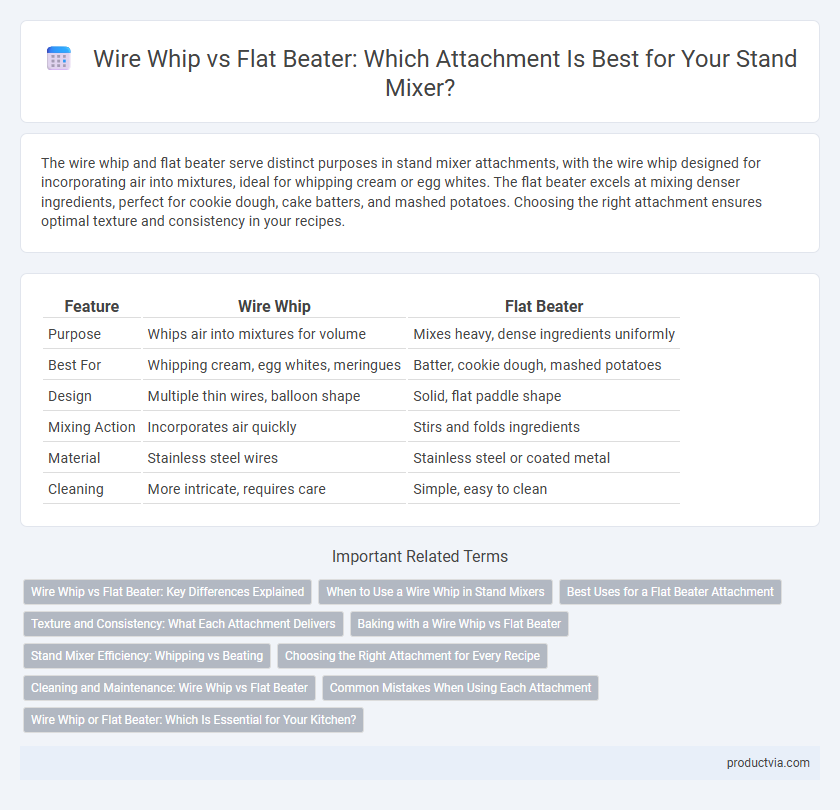The wire whip and flat beater serve distinct purposes in stand mixer attachments, with the wire whip designed for incorporating air into mixtures, ideal for whipping cream or egg whites. The flat beater excels at mixing denser ingredients, perfect for cookie dough, cake batters, and mashed potatoes. Choosing the right attachment ensures optimal texture and consistency in your recipes.
Table of Comparison
| Feature | Wire Whip | Flat Beater |
|---|---|---|
| Purpose | Whips air into mixtures for volume | Mixes heavy, dense ingredients uniformly |
| Best For | Whipping cream, egg whites, meringues | Batter, cookie dough, mashed potatoes |
| Design | Multiple thin wires, balloon shape | Solid, flat paddle shape |
| Mixing Action | Incorporates air quickly | Stirs and folds ingredients |
| Material | Stainless steel wires | Stainless steel or coated metal |
| Cleaning | More intricate, requires care | Simple, easy to clean |
Wire Whip vs Flat Beater: Key Differences Explained
The wire whip and flat beater attachments serve distinct purposes in stand mixers, with the wire whip designed for incorporating air into mixtures such as egg whites or cream, resulting in light, fluffy textures. The flat beater is ideal for mixing heavier, denser ingredients like cookie dough or cake batter, providing thorough and even blending. Understanding these key differences ensures optimal results by using the appropriate attachment based on the consistency and aeration needs of your recipe.
When to Use a Wire Whip in Stand Mixers
A wire whip in stand mixers is ideal for incorporating air into mixtures such as egg whites, whipped cream, and mousse to achieve light, fluffy textures. This attachment rapidly aerates ingredients, creating volume and stability essential for recipes that require a delicate, airy consistency. Use a wire whip when preparing meringues, souffles, or frosting where maximum lift and smoothness are crucial.
Best Uses for a Flat Beater Attachment
The flat beater attachment excels in mixing medium to heavy batters such as cookie dough, cake batter, and mashed potatoes, providing thorough blending without over-aerating the mixture. Its sturdy design handles dense mixtures efficiently, making it ideal for everyday baking tasks requiring uniform consistency. Unlike the wire whip, the flat beater ensures ingredients are combined smoothly without incorporating excess air, preserving the desired texture in baked goods.
Texture and Consistency: What Each Attachment Delivers
Wire whips incorporate air into mixtures, producing light, fluffy textures ideal for whipping cream or egg whites. Flat beaters deliver consistent, dense mixing suited for batters and doughs, ensuring even ingredient incorporation without over-aeration. Choosing the right attachment enhances texture and consistency based on recipe requirements and desired end results.
Baking with a Wire Whip vs Flat Beater
The wire whip is ideal for incorporating air into ingredients, making it perfect for whipping egg whites or cream to achieve light, fluffy textures in baking. The flat beater excels at mixing heavier batters like cookie dough and cake mixes, ensuring thorough blending without over-aeration. Choosing between a wire whip and flat beater depends on the desired texture and consistency in baked goods.
Stand Mixer Efficiency: Whipping vs Beating
Wire whips excel in incorporating air into mixtures, making them ideal for whipping cream, egg whites, and meringues with maximum volume and tenderness. Flat beaters are designed for thorough mixing and beating of denser ingredients such as cookie dough, cake batter, and mashed potatoes, ensuring an even and efficient blend. Choosing the appropriate attachment enhances stand mixer efficiency by optimizing texture and consistency for specific recipes.
Choosing the Right Attachment for Every Recipe
Wire whips excel at incorporating air into mixtures, making them ideal for whipping egg whites, cream, and light, fluffy batters. Flat beaters are best suited for medium to heavy mixtures like cookie dough, cake batter, and mashed potatoes, efficiently blending ingredients without overmixing. Selecting the right attachment ensures optimal texture and consistency tailored to each recipe's requirements.
Cleaning and Maintenance: Wire Whip vs Flat Beater
Wire whips require more meticulous cleaning due to their multiple thin wires that can trap batter and dough particles, making residue removal difficult. Flat beaters, with their solid, smooth surfaces, are easier to clean and maintain, as food particles do not get caught in crevices. Regular cleaning of both attachments after each use helps prevent buildup and ensures optimal mixer performance.
Common Mistakes When Using Each Attachment
Using a wire whip on heavy dough can lead to motor strain and uneven mixing, while a flat beater used for whipping cream or egg whites often fails to incorporate enough air, resulting in dense textures. Common mistakes include applying excessive speed with the wire whip, causing ingredient splatter, and overusing the flat beater for light, airy mixtures where aeration is crucial. Understanding the specific purpose of each attachment maximizes mixing efficiency and prevents damage to both the stand mixer and the ingredients.
Wire Whip or Flat Beater: Which Is Essential for Your Kitchen?
The wire whip excels at incorporating air into mixtures, making it essential for whipping cream, egg whites, and meringues to achieve light, fluffy textures. The flat beater is designed for mixing denser ingredients such as cake batter, cookie dough, and mashed potatoes, ensuring thorough, even blending without over-aeration. Choosing between a wire whip and flat beater depends on your culinary needs, but for versatile baking tasks, the flat beater is often indispensable while the wire whip is specialized for aeration-sensitive recipes.
Wire whip vs Flat beater for stand mixers Infographic

 productvia.com
productvia.com